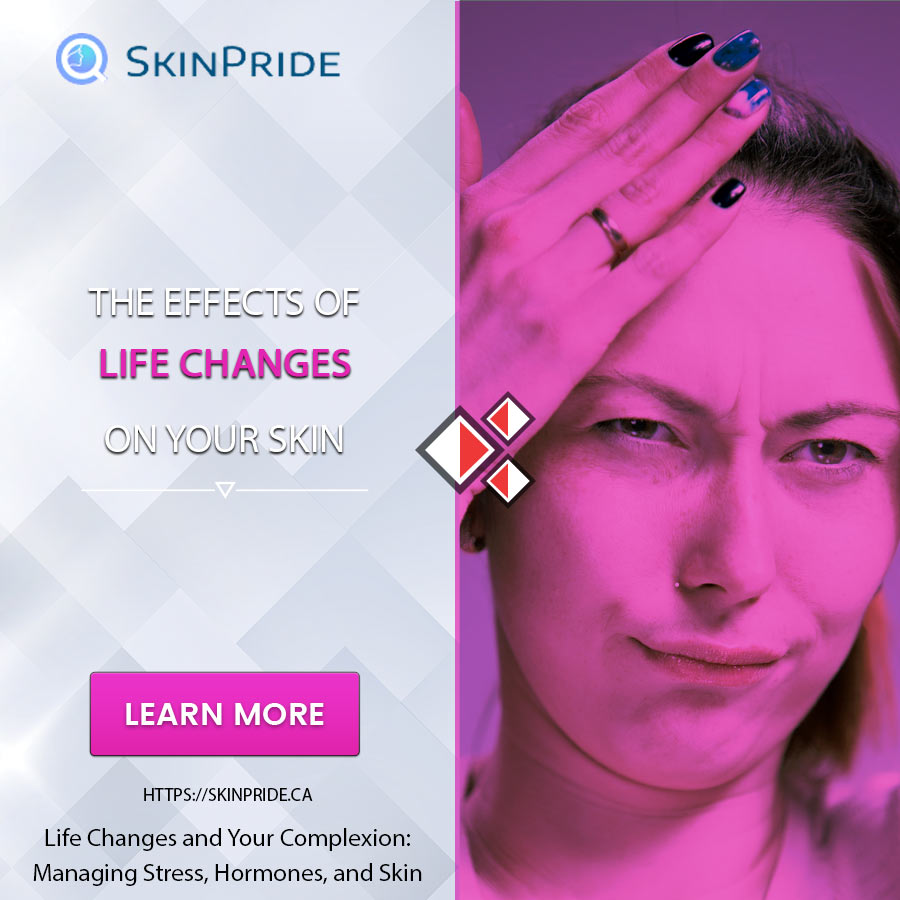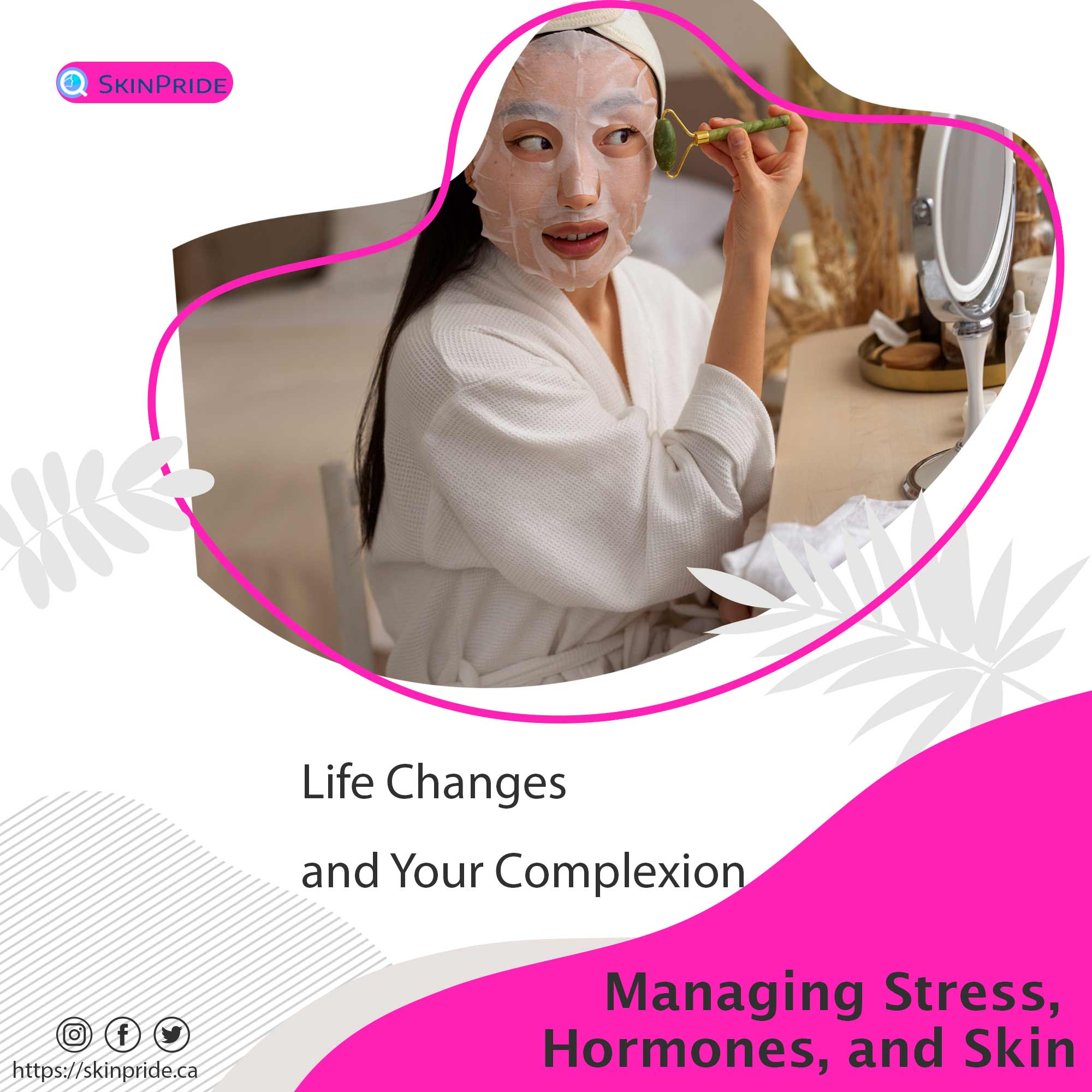Life Changes and Your Complexion: Stress, Hormones, and Skin Management
Stress is a part of life that affects our overall well-being in a variety of ways. Something that is oftentimes overlooked is the way that stress affects our skin. What we are going to talk about in this article is the complex relationship between stress, hormones, and skin. We are also going to talk about how lifestyle changes can leave a lasting impression on our complexion. We will also discuss the various treatments and products that can be used to reduce the effect of stress on our skin. Finally, we will discuss how best to handle stress in order to maintain healthy skin.
I. Introduction
A. Definition of stress and its impact on the body
Basically, stress is the body’s response to danger or challenge. Although our bodies are built to handle stress on a short-term basis, chronic stress can wear on our overall health, including our skin. Chronic stress can lead to breakouts, wrinkles, and a dull complexion. It can also weaken the immune system, leaving the body open to viruses and bacteria. To combat these effects, it is important to take steps to manage stress such as exercising, getting enough sleep, and practicing relaxation methods.
B. The relationship between stress, hormones, and skin health
The excess cortisol, the primary stress hormone, can have a devastating effect on our skin. It is crucial to understand this correlation to be able to care for our skin effectively. In order to alleviate this problem, one needs to reduce the stress level, be conscious, and exercise regularly. It is also important to hydrate and moisturize the skin regularly in order to stay soft and supple. A diet rich in antioxidants and healthy fats can also help reduce the negative effect of cortisol. Taking frequent breaks throughout the day and engaging in activities that one enjoys can also de-stress. In addition to these, using an app like SkinPride, which is an analyzer that tracks the condition of your skin and provides personalized tips, can be helpful in minimizing the impact of stress on your skin. SkinPride can help in tracking trends, following progress, and prescribing skincare routines and products according to your personalized requirements, thus helping you stress less and have better skin.
II. Stress and Hormones: The Basics
A. Role of Cortisol in the body's stress response
As part of the fight-or-flight mechanism, cortisol, or the “stress hormone”, plays a starring role. Chronic elevated cortisol levels can lead to inflammation and skin problems, though. Wrinkles, dryness, and sagging skin can be the outcome of this, as well as blemishes and breakouts. Cortisol can also act to decrease the production of collagen, an important structural protein that keeps skin healthy and looking young.
B. In what ways do hormones affect skin problems?
Hormones regulate the processes of the skin. Imbalances, whether due to stress or other factors, can cause acne, eczema, and psoriasis. To help individuals monitor and manage their hormonal imbalances, the SkinPride app provides personalized information and recommendations based on user data and input analysis. With the understanding of how hormones affect skin problems, users can take early steps towards having healthier skin.
C. Connection between chronic stress and hormonal imbalance
Chronic stress can lead to hormonal imbalances that are responsible for persistent skin problems. Knowing this connection is crucial for effective skincare. Stress hormones like cortisol can disrupt collagen production, leading to wrinkles and sagging skin. Stress can also increase oil production, leading to breakouts. Stress management is critical to maintain healthy skin. To allow individuals to manage their stress levels and achieve healthy skin, the SkinPride analyzer app provides personalized stress management techniques and skin tips. This is based on individual skin type and stress levels. Using this app, one can address both the external and internal causes of skin conditions caused by chronic stress.
III. Stress-related Skin Issues
A. Acne and stress correlation
Acne, a common skin disorder, often worsens under stress. We’ll explore how stress-induced hormonal changes contribute to acne development and exacerbation. Stress hormones, such as cortisol, increase oil production in the skin, leading to clogged pores and breakouts. Stress can also lead to increased inflammation, which can worsen existing acne. Finally, stress can also disrupt the skin’s natural healing processes, delaying the resolution of acne.
B. Psoriasis, eczema, and other stress-related skin diseases
Chronic stress can exacerbate skin conditions like psoriasis and eczema. It does so by leading to the release of inflammatory chemicals that harm skin cells. In order to manage stress, it is crucial to practice relaxation methods like yoga, meditation, and slow breathing. Besides that, adequate sleep and a well-balanced diet can also reduce levels of stress.
C. Premature ageing due to chronic stress
Chronic stress accelerates ageing. The ageing hormone cortisol can degrade collagen and elastin, thus leading to fine lines and wrinkles. Cortisol can also deplete the body of antioxidants, which are necessary to avoid cell damage. Stress management can reduce the risk of premature ageing. To help manage stress and prevent premature ageing, consider using the SkinPride app. This app provides guided meditation and relaxation techniques specifically designed to reduce stress levels, promote overall well-being, and maintain healthy, youthful-looking skin.
IV. Lifestyle Changes for Better Skin
A. Stress management techniques
Effective stress management is paramount to skin health. We’ll explore practical techniques, including mindfulness and relaxation exercises.
B. Importance of a balanced diet and hydration
Nutrition also plays an important role in skin health. A balanced diet comprising antioxidants, vitamins, and minerals can promote healthy skin. Ample water and staying away from processed food can also help. In addition, not applying harsh skincare products and utilizing gentle cleansers can help maintain healthy and glowing skin.
C. The impact of regular exercise on stress and skin
Regular exercise can be an excellent way of reducing stress and attaining healthy skin. Exercise helps improve blood circulation, which helps ensure healthy skin. Exercise also regulates stress hormones, which are culprits in causing skin problems such as acne. Exercise also has anti-inflammatory effects, which can help reduce redness and inflammation on the skin.
V. Skincare Routine Tips
A. Choosing stressed skin products
Picking the right skin care products is vital for stressed skin. We’ll provide tips on ingredients and products that soothe and energize. To make it easier, you can use the SkinPride app. The app analyzes your skin type and recommends suitable products based on your specific needs, ensuring that you choose the right products for your stressed skin.
B. Incorporating relaxation into your skincare routine
We’ll discuss how to turn your skincare routine into a therapeutic experience, such as relaxation techniques for maximum benefit. For instance, you can light a candle and take a few deep breaths while you moisturize. You can even massage your face in a circular motion. Take a few minutes at the end of the day to sit and focus on your breath and relax.
C. Importance of sleep for skin health
Quality sleep is required for skin renewal. Sleep helps to decrease stress, reduce inflammation, and improve skin elasticity. Sleep can also help to regulate hormones, which can have a direct effect on skin health. Finally, quality sleep replenishes skin cells, making skin look healthy and glowing.
VI. Professional help
A. Dermatologists and health professionals' consultation
Professional consultation is required at times. A helpful tool to get advice from dermatologists and healthcare professionals is the SkinPride app. The application provides an avenue where one can be linked with experienced professionals who could potentially give individualized suggestions and advice for their skin problems.
B. Therapy's role in stress management and its effect on the skin
Therapy can be a helpful tool in stress management. Taking time to talk to a therapist can identify the cause of stress. They can also provide solutions to stress, such as relaxation techniques, physical activity, and creating healthy coping habits. Talking to a therapist can also make you realize your hormones and how they affect the color of your skin. Other than stress reduction, therapy can also have a positive impact on your skin. By resolving underlying emotional issues, therapy can reduce stress-induced skin problems such as acne and eczema and result in a clearer complexion. In order to further help people learn about their hormones and manage their skin problems, the SkinPride app offers personalized resources and tools. Through the app, users can track their skin health, access educational content, and become part of a community of others who are facing the same challenges, all of which can augment the therapeutic gains for healthier skin.

VII. Conclusion
A. Recapitulating the main points
In conclusion, the interconnectedness of stress, hormones, and skin holds the secret to effective skincare. By incorporating stress management and lifestyle changes into your regimen, you will be well on your way to a healthier and radiant complexion.
B. Urging readers to prioritize stress management for healthy skin
As you embark on your journey to improved skin, remember that stress management is equally as important as your skincare routine. Prioritize self-care, and your skin will thank you.
FAQs
Yes, chronic stress can lead to hormonal imbalances that contribute to various skin problems.
Results vary, but many people notice positive changes within a few weeks to months.
Foods rich in antioxidants, omega-3 fatty acids, and vitamins can support skin health during stress.
While effective products help, a holistic approach including stress management is usually more impactful.
In severe cases, consulting a dermatologist or healthcare professional is advisable.

